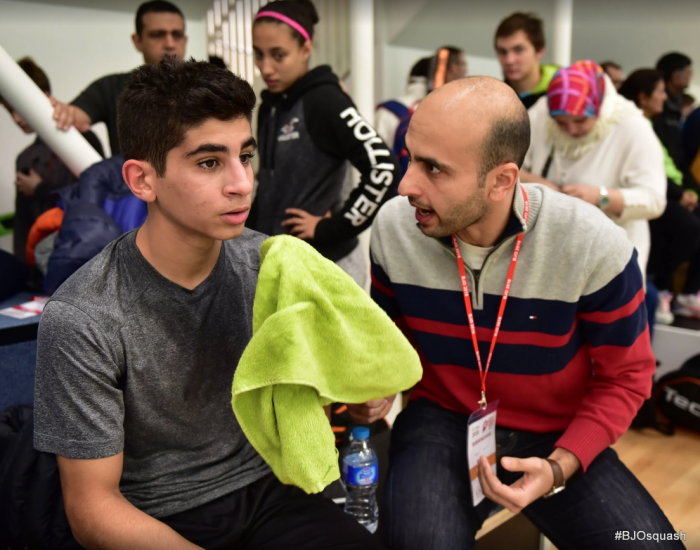Elite performers in sports such as squash are often lauded for their ability to play the right shot at the right time. While what is deemed the ‘correct’ shot may differ from player to player or coach to coach, it is certainly a key indicator of high level players that they have good decision making skills, that consistently result in a successful outcome. For those trying to improve their squash the ability to improve their decision making is thus an important factor, yet many players find it a difficult area of their game to consciously develop.
Unforced errors, lacking control of the T, having to work excessively hard physically, and opponents picking you off with easy winners are all symptoms of poor decision making.
While each sport has its own unique set of attributes required for success, particularly one so multi-faceted as squash, all competitive athletic pursuits can be generally divided into four main components: Technical, Tactical, Physical, and Mental.
A lot of coaching tends to focus primarily on the technical and the physical, with drills typically based around improving technique and fitness. The mental and tactical sides of the game are often left somewhat neglected, yet hold equal weight to be a successful player.
Part of this is because these areas can often be a little harder to actually ‘teach’.
“Our understanding and application of physical and technical skill development is much more advanced than our ability to train tactical awareness, decision-making, handling pressure and team dynamics”
Associate Professor Paul Gastin
Exercise and Sport Science Course Director, Deakin University
Yet in world class performers, good decision making under pressure is one of the key attributes that separates the elite. While it could be argued the players in the very top 5 to 10 have other elements that make them truly exceptional, from a strictly technical perspective most observers would find it hard to pick out the higher-ranked player if watching a player ranked around 20-30 in the world knocking up with someone ranked 60-70. The higher ranked player will typically win those match-ups however, due usually to primarily tactical and psychological factors – of which making consistently good decisions is a huge part.
So how can players improve their decision making skills?
Certainly, working with a good coach will help, one who discusses the why’s and when’s of all the various shots, and not just the what’s and how’s. Having your coach watch your games or review video with you and provide feedback on your decisions and tactics, is a useful way to get practical advice specific to your style of play.
 In the context of actual performance in competitive scenarios and the ability to apply knowledge however, research from Berry, Abernerthy, & Cote (2008) within Aussie Rules Football suggested that time invested was one key differentiator in those judged as better decision-makers – those that started younger and played more at an early age have an advantage. Playing more often, and against a wide variety of players will help go a long way to develop the strategic element of your game over time then – playing regularly against better, more established players can be particularly useful, if you make the effort to observe and learn from them.
In the context of actual performance in competitive scenarios and the ability to apply knowledge however, research from Berry, Abernerthy, & Cote (2008) within Aussie Rules Football suggested that time invested was one key differentiator in those judged as better decision-makers – those that started younger and played more at an early age have an advantage. Playing more often, and against a wide variety of players will help go a long way to develop the strategic element of your game over time then – playing regularly against better, more established players can be particularly useful, if you make the effort to observe and learn from them.
It’s important to also incorporate more open-ended practices into your training if you feel your decision making is not up to scratch. A lot of the standard squash drills tend to be quite rigid in nature – think boast/drive, drop/drive, drive/drive/boast and other typical routines. While holding merit from a technical perspective, drills that don’t include options should be de-emphasised in favour of more open-ended practices for those that struggle with decision making in games. Training needs to be representative of competition, so ensure you expose yourself to a variety of decision-making scenarios, focusing on different shots and different areas of the court – check out some of the squash practice videos from our library for some ideas.
One of the other factors often attributed to good decision-makers is ‘experience’, with older veterans often being able to get victories over younger, more athletic opponents with this accumulated knowledge. Interestingly there’s some actual physiological backing to this idea – research has shown that the pre-frontal cortex, the part of the brain responsible for decision-making, social behaviour and risk-taking, is still developing well into the mid-20s.
Watching more squash is another way to enhance your decision-making skills, focusing on what the professionals do in a variety of situations – there will obviously be differences in player styles, but watch for common themes such as when they use height to get out of trouble when they straighten up and reduce angles, and when they look to step in and volley for example.
Reducing tension and maintaining a more relaxed state when you play may also aid in better decision making. There are various strategies you can use to help enhance this, with sport psychology methods and exercises that calm the mind being useful tools in promoting more considered decisions unfettered by clouds of anxiety.
Other more general research into decision making has also highlighted the crucial role played by your reactions – getting onto a ball with more time gives more options and thus better decision making opportunities. Again, developing the ability to better read the game and get into position earlier comes chiefly from experience and practice. Anticipation in sport is a whole very interesting subject in itself – there’s some very interesting research highlighting key factors that contribute to this specifically in squash, that’s well worth a read.
Ultimately improving your decision-making skills is something that builds upon itself – as you play more and improve your overall game, you’ll gain increased confidence in the decisions you make, and this will, in turn, lead to your level rising still further.

While most methods for improvement boil down largely to diligence and practice, it’ll be interesting to see what advances are made in this area with the ever-increasing incorporation of more complex technology into sport – ever keen to squeeze an extra several percent performance out of star performers, the quest for better and better decision making is something that elite sport is already increasingly exploring through the use of cutting-edge tools such as eye-tracking glasses and virtual reality.
Gary Nisbet
B.Sc.(Hons), CSCS, NSCA-CPT, Dip. FTST
Squashskills Fitness & Performance Director
Sign up to the SquashSkills newsletter
Get world class coaching tips, straight to your inbox!